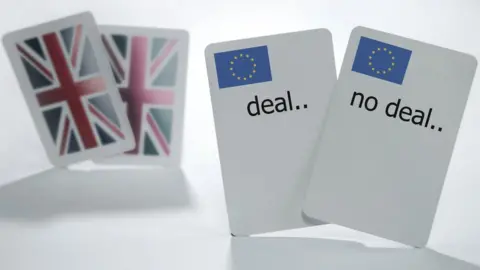Brexit: No-deal could hit NI economy, says DUP's Donaldson
The Democratic Unionist Party (DUP) recognises that a no-deal Brexit could hit Northern Ireland's economy in the short term, one of its MPs has said.
Sir Jeffrey Donaldson said his party was working with the government on how to mitigate any potential damage.
It follows a Department for the Economy report warning a no-deal scenario could put 40,000 NI jobs at risk.
Many jobs could "disappear almost overnight" in industries such as agri-food and haulage, says the report.
It warns of "immediate and severe consequences" for Northern Ireland's competiveness.
"We're talking to the government about how we can mitigate any such impact in the short term and that is what we want to do," said Sir Jeffrey.
While his party was keen to reduce any potential negative effect on Northern Ireland jobs, it was not advocating a no-deal Brexit, he added.
"We are advocating a Brexit with a deal and that means getting the withdrawal agreement approved by Parliament," he said.
"To do that we know the issue that needs to be addressed is the backstop."
 Getty Images
Getty ImagesThe report warns that exports to the Republic of Ireland could fall by between 11% and 19%.
That includes the "significant danger" that most north-to-south agri-food trade would stop.
"The impact of EU tariffs and non-tariff barriers will mean that whatever the Irish government or the EU may do or not do, many businesses will no longer be able to export to the Irish market," states the report.
'Border impact'
The department said it had produced the report as it had recently been asked about the statistics it holds on the implications of no deal.
It includes an analysis of how the UK government's no-deal policies on tariffs and the border will affect Northern Ireland.
The UK has said it will not impose any checks or tariffs on goods from the Republic of Ireland entering Northern Ireland.
The report says it is a "reasonable assumption" that tariffs will apply to goods going the other way, in line with EU law.
The government will also apply a temporary tariff regime for at all other UK borders which reduces the majority of tariffs to zero.
